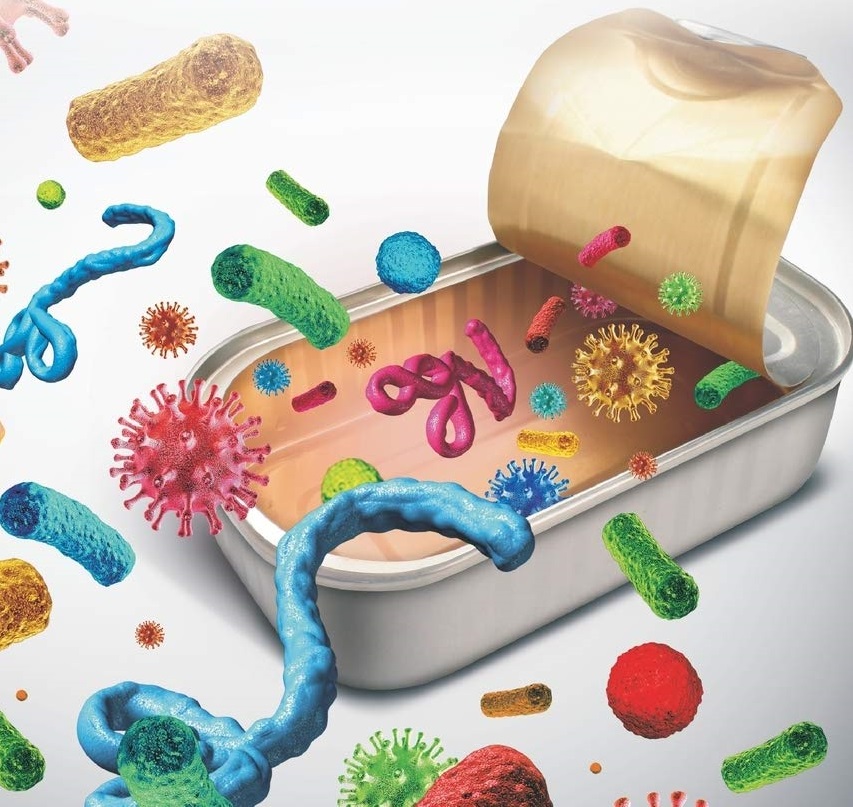Food microbiology is the study of the microorganisms that inhibit, create, or contaminate food. This includes the study of microorganisms causing food spoilage; pathogens which will cause illness (especially if food is wrongly cooked or stored); microbes utilized to manufacture fermented foods such as cheese, yogurt, bread, beer, and wine; and microbes with different helpful roles, like manufacturing probiotics.
Food safety is a major focus of food microbiology. Numerous agents of disease and pathogens are readily transmitted via food which incorporates bacteria and viruses. Microbial toxins are also possible contaminants of food; however, microorganisms and their products may also be used to combat these pathogenic microbes. Probiotic bacteria, together with those that produce bacteriocins can eliminate and inhibit pathogens. On other side, purified bacteriocins such as nisin can be added directly to food products. Finally, bacteriophages, viruses that only infect bacteria can be used to eliminate bacterial pathogens. Thorough preparation of food, including proper cooking, eliminates most bacteria and viruses. However, toxins manufactured by contaminants may not be liable to change to non-toxic forms by heating or cooking the contaminated food due to other safety conditions.
Fermentation is one among the methods to preserve food and alter its quality. Yeast, particularly Saccharomyces cerevisiae, is used to leaven bread, brew beer and create wine. Certain bacteria, as well as lactic acid bacteria, are utilized to produce yogurt, cheese, hot sauce, pickles, fermented sausages and dishes like kimchi. A general effect of these fermentations is that the food product is no that hospitable to other microorganisms, as well as pathogens and spoilage-causing microorganisms, thus extending the food’s shelf-life. Some cheese varieties also need molds to ripen and improve their characteristic flavors.
Several microbially manufactured biopolymers are utilized in the food industry:
Alginate
Alginates can be utilized as thickening agents. Although listed here under the category ‘Microbial polysaccharides‘, commercial alginates are currently only manufactured by extraction from brown seaweeds like Laminaria hyperborea or L. japonica.
Poly-γ-glutamic acid
Poly-γ-glutamic acid (γ-PGA) manufactured by various strains of Bacillus has potential applications as a thickener in the food industry.
To ensure safety of food products, microbiological tests like testing for pathogens and spoilage organisms are needed. This way the risk of contamination under general use conditions can be inspected and food poisoning outbreaks can be prevented. Testing of food products and ingredients is important along the whole supply chain as possible flaws of products can happen at every stage of manufacturing. Apart from finding spoilage, microbiological tests can also determine germ content; verify yeasts and molds, and salmonella. For salmonella, scientists are also making rapid and portable technologies capable of identifying unique variants of Salmonella.
Polymerase Chain Reaction (PCR) is a rapid and cheap method to generate numbers of copies of a DNA fragment at a particular band. For that reason, scientists are utilizing PCR to find various kinds of viruses or bacteria, such as HIV and anthrax based on their unique DNA patterns. Various kits are commercially available to help in food pathogen nucleic acids extraction, PCR detection, and differentiation. The verification of bacterial strands in food products is very important to everyone in the world, for it helps prevent the happening of food borne illness. Therefore, PCR is recognized as a DNA detector in order to amplify and trace the presence of pathogenic strands in different processed food.
The relationship between microbes, the human microbiome, diet, and food safety has played a critical role in the improvement of the new food industry with its plethora of choice and variety and the consequent developments in our overall quality of life.
Our knowledge of just how this complex balancing act contributes to the improvement of human society through the most basic of means, our food, has continued to improve over the last several thousand years. From the earliest fermentation of beer and production of bread to the probiotic foods which have been appearing on supermarket shelves over the last two decades, the application of microbiology to the food industry will certainly continue well into the future.
We at KERONE have a team of experts to help you with your need for Microbiology from our wide experience.

